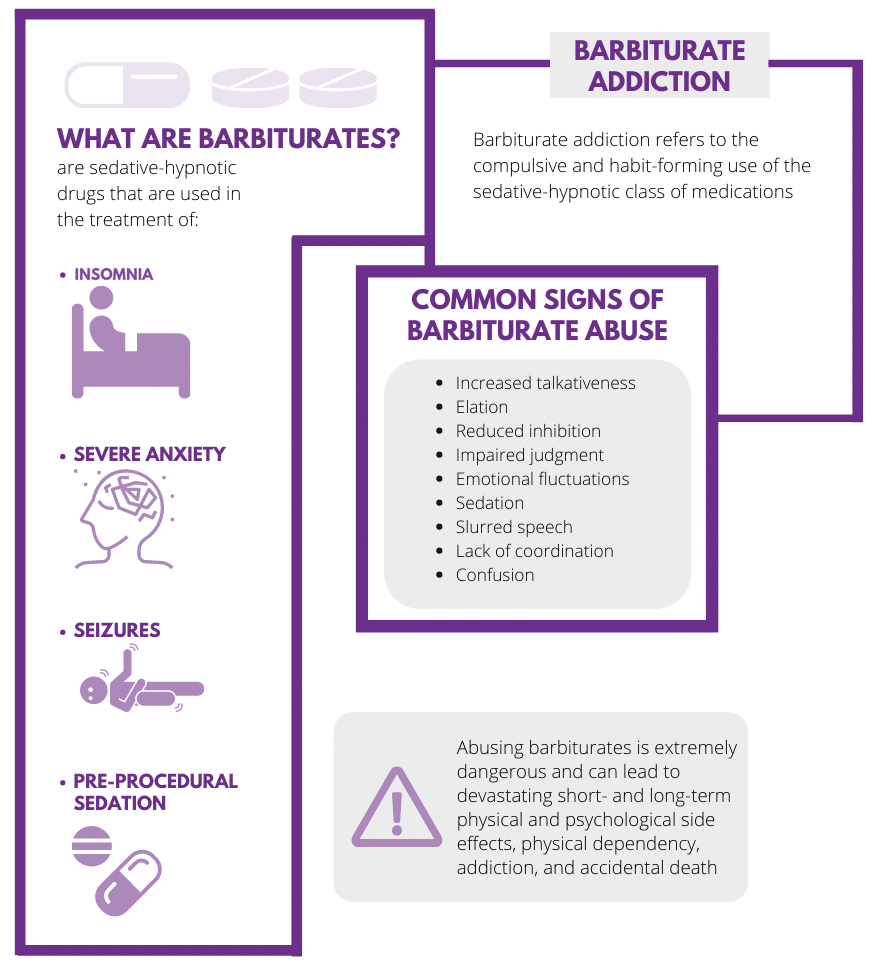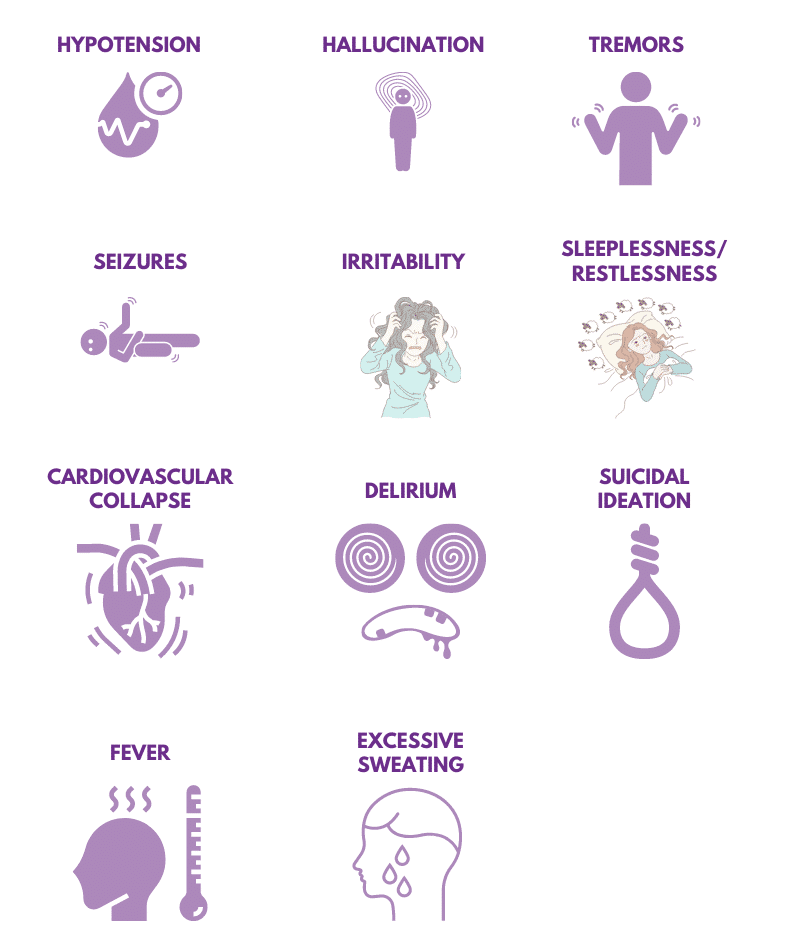Barbiturate addiction is when someone compulsively and habitually uses sedative-hypnotic medications. These medications were previously used to treat individuals with sleep-related disorders or severe anxiety. While barbiturates were popular in the 1960s and 1970s, medical professionals do not commonly prescribe these medications. Barbiturates quickly became a widely abused drug during their popularity. This was due to their ability to reduce anxiety, lower inhibitions, and alleviate unpleasant side effects from other drugs of abuse.

In current times, barbiturates are typically obtained illegally. Barbiturates are known by the street names “yellow jackets,” “downers,” “goofballs,” and “reds.” Barbiturates work by upgrading the activities of the neurotransmitter GABA, which at that point shuts off huge bits of the mind, delivering sedative and calming impacts. After some time and research, doctors began to notice that barbiturates were a dangerously addictive class of drugs. This was because the dose required to produce sedation was similar to the dose that could cause coma and death. After coming to this realization, medical professionals stopped using barbiturates and began using benzodiazepines such as Klonopin in an attempt to reduce the rate of fatality risks.
These downers are found in the form of multicolored pills, capsules, or in liquid form. While barbiturates are generally abused in pill form, these drugs can be injected intravenously to produce faster effects. The varying forms of barbiturates differ in the length of time their effects last. To explain, some barbiturates may cause effects that can last up to days at a time, while others may only last a few minutes. Because these substances are fat-soluble, they can easily cross the blood-brain barrier. In other words, since barbiturates dissolve in body fat, they can accumulate in the body and eventually re-enter the bloodstream.
Table of Contents
ToggleWhat are Barbiturates?
Barbiturates are highly addictive and can cause dependency at an alarming rate. That being said, individuals abusing barbiturates are at high risk for developing an addiction and should receive professional substance abuse help immediately.
To understand barbiturate addiction, you must first understand exactly what a barbiturate is. By definition, barbituates are sedative-hypnotic drugs used to treat insomnia, severe anxiety, seizure disorders, and pre-procedural sedation. While barbiturates effectively treat these issues, medical professionals typically use safer and less addictive drugs.
Barbiturates are controlled substances due to their potential for abuse, physical dependency, and addiction. Some of the most common forms of barbiturates include:
- Luminal (phenobarbital).
- Brevital (methohexital).
- Seconal (secobarbital).
- Butisol (butabarbital).
- Fiorinal (butalbital).
Phenobarbital, or Luminal, has a very narrow therapeutic range. In other words, this medication must be administered at exactly the right dosage to be safe and effective. Individuals taking this barbiturate medication to control seizures are regularly monitored to ensure that the drug concentration in their body is at the correct and safe range. Unfortunately, individuals abusing barbiturates like phenobarbital are unlikely to visit a doctor to test their levels. Due to this, illicit users of barbiturates are at extremely high risk of quickly boosting their concentration to toxic levels in their bodies.
Even short-term use of barbiturates can be dangerous if taken in excess. This leads to harmful side effects and potentially life-threatening consequences. Additionally, it is extremely common for individuals addicted to barbiturates to mix this drug with other substances, such as stimulants, alcohol, or narcotic painkillers. As a result, the risk of adverse effects is even higher.
Short-Term Effects of Barbiturates
Short-term effects can include drowsiness, impaired judgment, and decreased inhibitions. Additionally, barbiturates can affect a person’s ability to think clearly and make decisions. This leads to confusion and memory problems. Overdose can also occur if barbiturates are taken in excessive amounts, leading to severe respiratory depression, loss of consciousness, and potentially death.
Long-Term Effects of Barbiturates
The long-term use of barbiturates can lead to various negative effects on a person’s health and well-being. With continued use, barbiturates can cause physical dependence and tolerance. This leads to the need for higher and higher doses to achieve the desired effect. Additionally, long-term barbiturate use can lead to liver and kidney damage and other health problems such as decreased cognitive function, memory loss, and depression. Furthermore, stopping barbiturates suddenly after long-term use can result in severe withdrawal symptoms, including seizures, tremors, and delirium. It’s important to be aware of the potential long-term effects of barbiturate use and only use these medications as directed by a doctor.
Signs of Barbiturate Abuse
Oftentimes, individuals abusing barbiturates are attracted to their pleasant psychoactive effects, which are similar to alcohol. Some of the common effects of barbiturates include making the user feel happier, more relaxed, extremely talkative, and less inhibited. As previously stated, individuals may swallow barbiturates in pill form, intravenously inject them, or crush them up and snort them. Abusing barbiturates is extremely dangerous and can lead to devastating short- and long-term physical and psychological side effects, physical dependency, addiction, and accidental death.
Some common signs of barbiturate addiction may include, but are not limited to:
- Increased talkativeness.
- Elation.
- Reduced inhibition.
- Impaired judgment.
- Emotional fluctuations.
- Sedation (users may seem really relaxed or drowsy).
- Slurred speech.
- Lack of coordination (users may fall over frequently).
- Confusion.
Effects of Barbiturate Abuse and Addiction
Individuals who are abusing barbiturates will exhibit signs similar to those who abuse alcohol. Be aware of the physical, mental, and social effects of barbiturate abuse if you suspect a loved one is addicted to barbiturates.
Common physical effects of barbiturate abuse
- Increased sensitivity to sound.
- Increased pain sensitivity.
- Changes in blood pressure.
- Breathing difficulties.
- Increased risk of developing bronchitis and pneumonia.
- Irregular menses in women.
- Sexual dysfunction.
- Increased risk of kidney failure.
- Respiratory depression.
- Coma
- Death
Common mental effects of barbiturate abuse
- Anxiety, restlessness, or panic.
- Impaired mental functioning.
- Emotional instability.
- Loss of short- or long-term memory.
- Insomnia.
- Hallucinations.
- Depression.
Individuals abusing barbiturates will also suffer from occupational and social functioning effects.
These side effects may include:
- Occupational issues or job loss.
- Loss of interest in hobbies and responsibilities.
- Strained relationships.
- Neglect of self-care, such as exercise and diet.
- Fatalities.
If you or a loved one are abusing barbiturates and displaying any previous symptoms, it may be time to get help. Barbiturate dependency can lead to an individual experiencing severe withdrawal symptoms when a person stops using the substance. Due to this, individuals suffering from barbiturate addiction should attend a medical detox facility to ensure safety and comfort.
Symptoms of Barbiturate Withdrawal
Because most barbiturates are related to short or intermediate-acting drugs, discontinuing the drug can cause severe withdrawal symptoms. Oftentimes, many of these symptoms will appear within the first few hours after the last use of barbiturates. However, these symptoms may last up to a few weeks. This depends on the dosage taken and how long an individual abused the substance.
The symptoms of barbiturate withdrawal can include the following:

Barbiturate detox facilities are an extremely important step in recovering from a barbiturate addiction. Medical experts can help administer the detox procedure, limit withdrawal impacts by gradually tapering, and give clinical oversight. Clinical oversight is suggested during the withdrawal procedure, as withdrawal symptoms can be very serious. Barbiturate addiction treatment programs can help with withdrawal symptoms and break the cycle of abuse and addiction.
Barbiturate Addiction Treatment
If you’re trapped in a cycle of barbiturates addiction, you may think you don’t need professional help. Barbiturate addiction can be lethal, negatively impacting your life physically, mentally, and socially. Luckily, help is accessible to individuals who wish to defeat their addiction and unreservedly live their lives. The initial move towards conquering a dependence on barbiturates is to perceive the current issue. If you need help, find a professional barbiturates addiction treatment program to overcome your addiction. While addiction to barbiturates can be challenging for you or your loved ones, this fight doesn’t need to happen alone.
An expert treatment team or rehab program can provide the best care and, eventually, give you the hope and coping skills you need to conquer your addiction. If you want to beat barbiturate addiction, give Agape Treatment Center a call today! Not only will our staff help you to become free from substance abuse, but you will also learn how to live your life happily and successfully.







